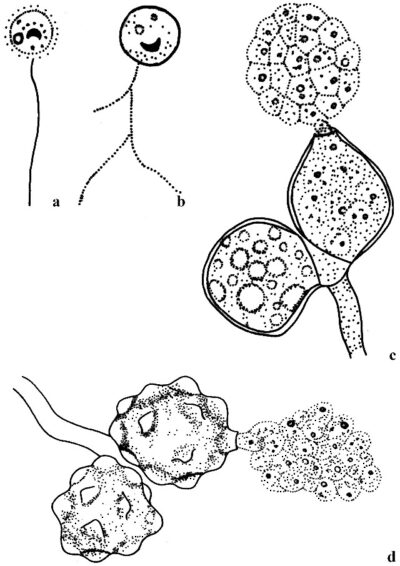Fungalpedia – Note 506, Polyphagales
Polyphagales Doweld
Citation when using this data: Tibpromma et al. 2024 (in prep.) – Fungalpedia, Chytridiomycota.
Index Fungorum, Facesoffungi, MycoBank, GenBank, Fig. 1
Classification: Chytridiales, Chytridiomycetidae, Chytridiomycetes, Chytridiomycotina, Chytridiomycota, Fungi
Doweld (2014) introduced Polyphagales to accommodate the monotypic family Polyphagaceae. The order is characterized by an interbiotic thallus, monocentric, eucarpic, and functions as a prosporangium with an apical pore, bearing branched, strongly polyphagous rhizoids. Zoospores posteriorly uniflagellate, with lipid globules associated with microbodies, mitochondria, and rumposomes (fenestrated cisterna) oriented toward the posterior end of the zoospore, with a laterally directed striated rootlet; concentric layers of cisternae traversing the ribosomal aggregation; membranous labyrinth associated with the nucleus; hexagonally organized cell coat; cytoplasmic spines scattered over the cell surface. Resting spores are sexually formed in conjugation tubes produced by one of the two conjugating thalli (Wager 1913). There are 15 epithets of the monotypic genus Polyphagus (Wijayawardene et al. 2022).
Type family: Polyphagaceae F. Maekawa
Other accepted species: Species Fungorum – search Polyphagales
Figure 1 – Polychytrium aggregatum. a Zoospore showing opaque lunate body surrounded by granules. b Germinating zoospore. c Pair of apical sporangia in different stages of development. d Pair of tuberculate sporangia; upper one discharging zoospores. Redrawn from Ajello (1942).
References
Ajello L. 1942 – Polychytrium: a new cladochytriaceous genus. Mycologia 34(4), 442-451.
Doweld AB. 2014 – Nomenclatural novelties. Index Fungorum 81, 1-1.
Entry by
Tian X, School of Food and Pharmaceutical Engineering, Guizhou Institute of Technology, Guiyang, Guizhou, 550003, P. R. China
(Edited by Saowaluck Tibpromma, & Achala R. Rathnayaka)
Published online 9 December 2024
